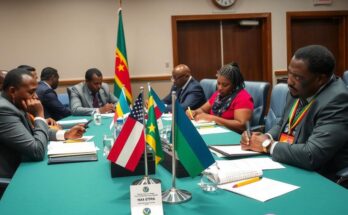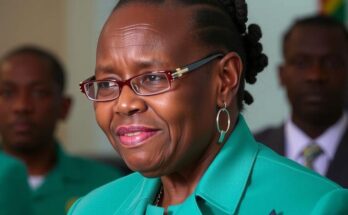The leak of explicit videos involving Baltasar Ebang Engonga, a nephew of Equatorial Guinea’s long-serving president, has provoked intense scrutiny and speculation about political maneuvering for succession within the ruling elite. The scandal reflects deep-seated issues of corruption and manipulation in a regime where dissent is stifled and public morality is precarious.
The recent scandal in Equatorial Guinea, involving the widespread leak of numerous explicit videos featuring Baltasar Ebang Engonga, a senior civil servant and nephew of the current president, has captivated and scandalized both domestic and international audiences. Estimates indicate that between 150 and over 400 videos have surfaced online, featuring Engonga in compromising situations with various women, many of whom are connected to the political elite. This has raised eyebrows in a country under strict control, making the veracity of these claims difficult to substantiate due to the lack of a free press. This incident has also sparked speculation about its underlying motives. Observers suggest that the leak may be a strategic maneuver aimed at nurturing political rivalry ahead of a potential succession crisis, as President Teodoro Obiang Nguema has ruled since 1979 and is now 82 years old. Engonga’s arrest for allegedly embezzling state funds coincided with the leak of these damaging videos, leading to theories that his reputation is being systematically undermined by other power contenders, including Vice President Teodoro Obiang Mangue. Despite government attempts to contain the situation, including issuing orders to telecom companies to halt the dissemination of the videos, the materials have circulated widely on platforms like Telegram and WhatsApp. The current political climate exacerbates the tension, as public outrage over the morality of a high-ranking official’s behavior combines with broader grievances about corruption and government mismanagement. The government alleges efforts to clamp down on such scandals, citing the need to protect the nation’s image. However, critics assert that this incident highlights systemic issues within the country’s leadership, where elite corruption and brutality towards opponents foster an environment of fear and repression.
Equatorial Guinea, under the long-term leadership of President Teodoro Obiang Nguema, has experienced both economic highs and lows, particularly following the decline in oil revenues. The nation of approximately 1.7 million inhabitants faces significant challenges with poverty and a tarnished human rights record, leading to international scrutiny. In a political atmosphere marked by suppression of dissent and corruption, rivalries among elites surface frequently, often accompanied by scandalous revelations to discredit potential threats to the ruling hierarchy. Activists have noted that this sex tape scandal is not merely an incident of personal indiscretion but reflects deeper issues within a highly stratified society, where power struggles are often both public and sordid.
The unfolding sex tape scandal involving Baltasar Ebang Engonga illustrates the intricate, often perilous, web of power dynamics within Equatorial Guinea. As the nation grapples with a significant transition phase, with President Obiang’s advanced age posing questions about succession, the implications of such a scandal extend beyond individual behavior to encompass broader themes of corruption, elite rivalry, and systemic abuse. While the explicit content captures wide attention, it is vital to recognize it as a symptom of entrenched issues that plague governance in Equatorial Guinea, underscoring the need for a more profound examination of political integrity in the region.
Original Source: www.bbc.com




